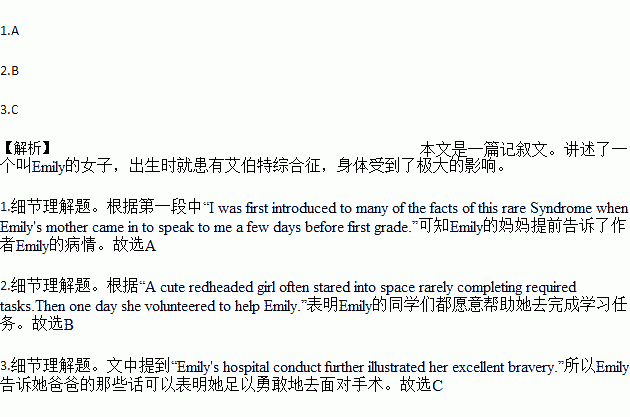题目内容
Emily did not look like other infants(幼儿)when she was born.She had a distinct appearance facially,standing out among the other babies in the hospital.She was born with Apert Syndrome,which affects physical appearance in several ways.I was first introduced to many of the facts of this rare Syndrome when Emily's mother came in to speak to me a few days before first grade.
Now Emily found herself in a new school,with unfamiliar classmates.I noticed a little girl's startled expression as she focused on Emily.Emily smiled at the child and the little girl smiled back.The first lime my teaching aide had to leave the room,a child jumped up and asked if she could help Emily.This girl stood over Emily,dotting words and sentences for her trace,exactly as her aide did each morning.A cute redheaded girl often stared into space rarely completing required tasks.Then one day she volunteered to help Emily.
Then came that day in March when Emily's mom told me she was to have facial surgery.I had to explain her absence.I was asked many logical questions."Did it hurt?" "Will she come back?"
Emily's hospital conduct further illustrated her excellent bravery.She told her father,"I do not want you to carry me into the operating room."She explained to the attending nurse that she did not want any medicine and didn't want to wear the blue operating room cap or change into hospital clothes.Emily walked into the operating room on her own feet!
It was inevitable that some of the children would see Emily after her operation,before she came to school for a visit.I had to explain that she was wearing something that looked like a catcher's mask on her face.Some visited her at home.Each child who saw her came to school greeted the class by shouting,"I saw Emily!"my first-graders had the ability to perceive the heart of Emily and I feel certain that she will continue to use her remarkable(非凡的) strength of character to overcome the struggles she has yet to face.
1.The first paragraph implies that Emily's mom .
A. told the writer about Emily's disease in advance
B. begged the writer to care for Emily personally
C. advised the writer to get along with Emily
D. introduced Emily to the writer in person
2.While at school,Emily's classmates .
A. treated her as much independently as possible
B. were all eager to help her with learning tasks
C. asked her a lot of questions on her disease
D. felt frightened at the sight of her face appearance
3.From what Emily said to her father,we know .
A. she was afraid of taking medicines
B. she didn't like hospital clothes at all
C. she was brave enough to face the operation
D. she required attending nurses to carry her

